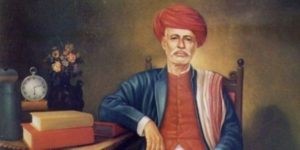Published on: April 12, 2022
JYOTIBA PHULE
JYOTIBA PHULE
NEWS
Birth Anniversary of Jyotiba Phule celebrated.
ABOUT MAHATMA PHULE
- Prolific social activist and thinker who helped to establish women’s education in India, particularly in Maharashtra.
- Born on April 11, 1827, in Katgun, Maharashtra’s Satara District.
- Organising principles were both inclusive and dichotomous as an iconic and revolutionary intellectual from Maharashtra
- Referred to stree-shudra-atishudra as one category that was fighting Brahmanical supremacy
- Taught his wife (Savitribai) to read and write and the couple went on to open Pune’s first indigenously run school for girls, where they both taught.
- Firm believer in gender equality, and he demonstrated this by including his wife in all of his social reform efforts.
- Established three schools by 1852 which were closed by 1858 due to a lack of funds Recognised the plight of widows and established an ashram for young widows, eventually becoming an advocate for widow remarriage.
- Built a common bathing tank outside his house in 1868 to show his inclusive attitude toward all people and his desire to dine with anyone, regardless of caste.
- Began public awareness campaigns that later inspired stalwarts such as Dr. B.R. Ambedkar and Mahatma Gandhi to take major steps against caste discrimination.
- Liberty, Egalitarianism, and Socialism were the foundations of his ideology.
- Was influenced by Thomas Paine’s book The Rights of Man, and believed that the only way to combat social evils was for women and members of the lower castes to become educated.
- Major Publications: Tritiya Ratna (1855); Powada: Chatrapati Shivajiraje Bhosle Yancha (1869); Gulamgiri (1873), Shetkarayacha Aasud (1881).
- Founded Satyashodhak Samaj in 1873, which means “Seekers of Truth.”
- Was appointed commissioner to the Poona municipality in 1883.
- Title of Mahatma by Vithalrao Krishnaji Vandekar
- died on 28th of November, 1890
- In Phule Wada, Pune, Maharashtra, a memorial dedicated to him has been built.

